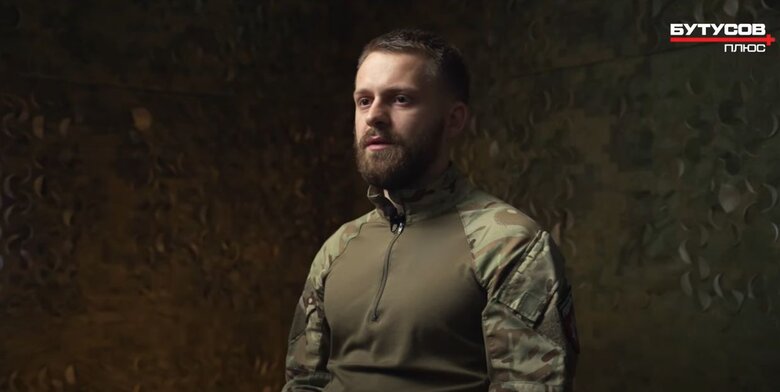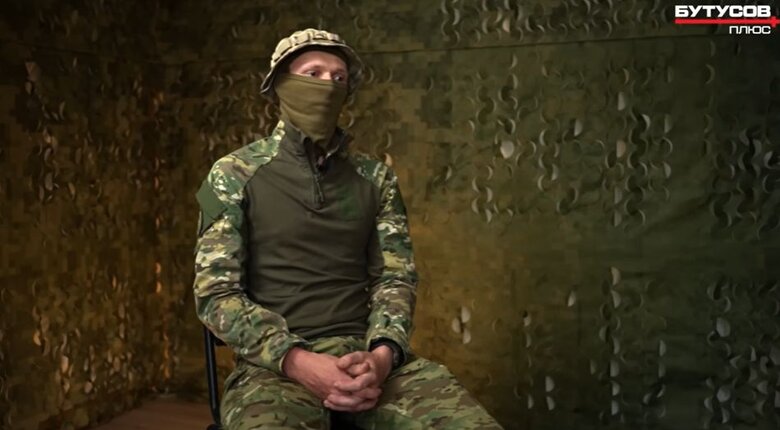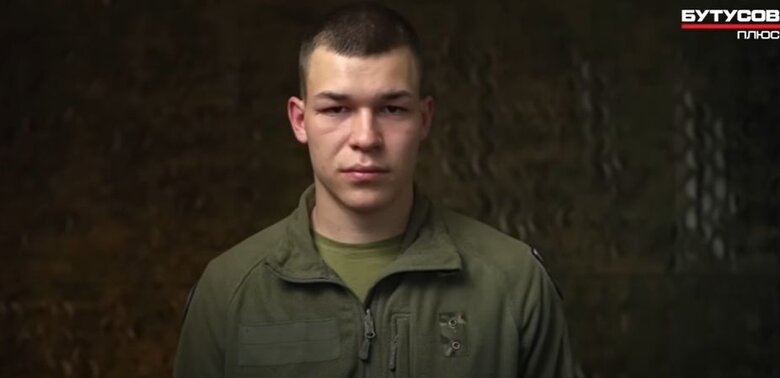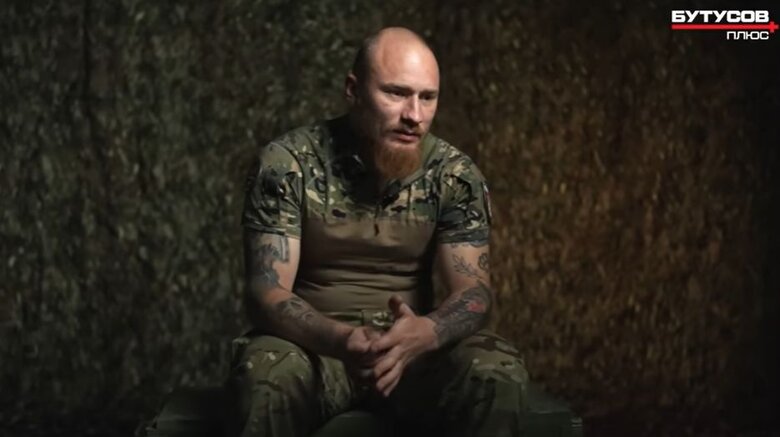35 days in Toretsk. "Liut" (Rage) brigade
Unique documentary footage of a clash inside a building in Toretsk with an enemy group from the Russian Armed Forces’ 132nd Motorized Rifle Brigade during a 35-day combat mission at minus 18 degrees Celsius.
Deputy commander of the assault regiment "Safari," call sign Gryz:
We faced the 132nd Brigade, a motorized rifle brigade, a regular infantry unit of the Russian Federation. They are a mixed bunch. There are seasoned fighters, some dating back to the ATO period, since this is Horlivka, with personnel from separatist formations. Their tactic is this: the group moves forward with one senior, seasoned fighter who has been in combat multiple times, fully oriented to the terrain, fully aware of who he is, where he is, and what his task is. Attached to him are simply cannon fodder types who serve as the crowd. They just move, shoot, hold ground, and wait for reinforcements to build up on the position. Then they hold the position, wait. Once reinforced, they push further and further until they kill their objective. This was the climax, you could say, of the battle for the city. It took place closer to the central part of the city.
The Island is one of these buildings. It’s not a high-rise but a two-storey structure with three stairwells. I decided to move onto that position to join my fighters, basically just link up with them. Accordingly, a neighbouring position was rotating back to its sector; the conditions were favourable, there was fog, almost no drones in the air, FPV units couldn’t fly, and enemy reconnaissance was heavily impeded, ours too, for that matter. So I jumped into an infantry fighting vehicle of the adjacent infantry unit, reached their position, contacted my guys, and simply crossed over to our regiment’s position. That was in the final days of January 2025; from the first days of February, sheer hell began on that position.
They had the approach covered almost perfectly, yet even under our suppressive fire the enemy managed to slip an assault group into the building. The gap they had to cross was barely 50 metres, but they sprinted it and got inside. We ended up with our team and the enemy team sitting right behind the wall and we knew it.
While their drones were lifting off, buzzing closer, trying to decide which window to break in through, we needed to buy time. Banking on pure luck, I tried to mislead them: I shouted that we were friendlies, just fed them a line that we were from the 101st Regiment, a reconnaissance detachment, completely at random.
They took the bait and began shouting back that they were from the 132nd, "all good, guys, we’re friendlies." Then they asked for my call sign. I could hear them over the radio querying their headquarters: was there such a unit here, did that call sign exist? HQ came back with something like, "Maybe, what’s the call sign?" While they were sorting it out they stopped advancing, hunkered down and apparently decided there was no need to storm the place if friendlies were already inside. That was exactly when our FPV drones arrived and that was it, cards on the table.
We cleared every sector, realised we controlled most of the ground floor, and kept a solid link with headquarters.
The enemy was flying FPV drones too, and using artillery. FPVs were coming straight through the window frames above our heads, it was rough. The roof is full of holes, and both the windows above you and the large apartment windows allow FPV drones to fly in easily.
Officer with the call sign "Virsh," Safari Assault Regiment, Liut National Police Brigade
About fifteen FPV drones, fifteen, maybe sixteen, came our way during that assault. We fought for roughly two, two and a half hours. After that, two of the enemy’s wounded crawled off while one stayed behind, though we didn’t know it yet. We found a backpack near the window on the first floor. There was a power bank with the call sign of the enemy written on it.
Gryz: At some point, one of our guys got a gut feeling, walked over and said, "Listen, lads, I know he’s here, give me a second." He shouted the call sign: "You there?" And that b#stard yelled back, "Yeah, I’m here!" That’s when we realised he wasn’t just lying right under our noses. He’d slipped clear of the fight: the balcony slab on the first floor had collapsed and he’d crawled in under it, hiding there.
You hear all those frontline tales about Russians crawling through pipes, digging under positions, popping up out of nowhere, same story here. We had a sentry post, all sectors were covered, business as usual. Then our own wounded man downstairs, the one sitting with a POW, comes running up and says there’s a commotion in the cellar, someone’s crawled in. Basically, there was somebody down there. We left one man covering from above and headed down.
Police officer Borchyk, Safari Assault Regiment, Liut National Police Brigade.
He noticed a light coming from the collapsed basement area. Virsh tossed two grenades in.
Virsh: First grenade went in, quiet. Second one, quiet too. We shouted, "Surrender!"
Gryz: One of them turned out to be a veteran, we later found out his call sign and learned he'd been fighting there for a long time. He managed to escape, but the other one couldn't squeeze through the tunnel they had dug. We pinned him down and gave him a choice: either a grenade flies in, or you crawl out. In the end, he came out to us, and we took him into custody and tossed him in with the first prisoner.
They tried to rotate us out of the position, our command did. Because it was winter, and we hit the cold snap. It was down to minus 18, minus 20 at night. And this was the kind of place where you couldn’t warm up at all. Nothing. We were short on manpower, some of our wounded were still manning posts, unable to function properly. There were, what, four of us left. You can’t post just one person, you need at least two on watch. We were already prepped for rotation. Standing there with our assault packs. Everyone still on duty, still watching their sectors, but ready to load into the vehicle and pull out. I’m standing there, watching the sector, and then our vehicle rolls in. The door opens, and the group commander manages to jump out. The vehicle hadn’t even come to a full stop when an FPV drone slammed into its side. The group commander got thrown clear, shredded by shrapnel. Everyone inside took the hit from the drone-dropped munition. Shrapnel tore through all of them, too. And the guys made what was honestly the only right call, they slammed the doors shut and drove out of there. That really was the right decision. The enemy drones kept trying to finish off the group commander who had jumped out.
Virsh: He wasn’t responding to shouts or voice contact. The only way to identify him was by the sound of his radio. I was trying to reach him and could hear it, so I thought, either it’s him or someone had dropped their radio. Eventually, we confirmed it was him, because he wasn’t in the vehicle. I kept trying to establish voice contact, yelling at him to come to. But the enemy UAV was constantly hovering above us, watching everything. I wasn’t given permission to leave the position to retrieve him. He managed to get up and walk maybe three or four meters. After that, I quickly pulled him into the basement, applied a tourniquet, then followed protocol from there.
Gryz: What really weighed on me in that moment was having a severely wounded guy, an immobile wounded the basement, while we were under assault. And you’re sitting there thinking: if you screw up, if they break through and storm the place, what do you do with the heavy wounded? Like, say I manage to fall back to another position, fine, I can relocate. Let’s say we realise we can’t hold the position, they push us out somehow, and we shift to the next building and keep carrying out the mission. Is that a possible scenario? Hypothetically, yes.
But what about him? What do you do with the wounded?
About a day later, if I remember correctly, an M113 managed to break through to us, not as a full rotation, just two extra fighters added to our group. The weather was clear again, freezing cold, a clear night with stars shining like daylight. The vehicle hadn’t even reached us yet when drones were already flying overhead and crashing to the ground. There was also a situation where, by the time the vehicle arrived, the building was already heavily damaged, and bricks and chunks of rebar were flying in from neighboring buildings. In front of our entrance, there was a huge pile of bricks and rebar stacked up. An M113 pulled up, turned sideways, but drones were already dropping explosives on it. It tried to open the ramp, but it simply wouldn’t budge because of the pile of bricks blocking it. It was stuck against the ruins and couldn’t open.
Lieutenant Jackson, police mechanic-driver of the M113, Safari Assault Regiment, Liut National Police Brigade:
A drone hovered overhead with three munitions ready to drop, waiting for the ramp to open so it could release its payload. But the ramp wouldn’t open, it kept spinning in place, and they couldn’t figure out how to position the vehicle so the guys could quickly get inside. Eventually, the ramp stayed shut, and the enemy dropped all three munitions right next to the M113.
Gryz: At some point, it was clear the M113’s ramp wasn’t going to open, but I saw them open the side doors instead, that feature lets you open just the doors. I gave the order: they grabbed the wounded soldier, who couldn’t fit through those narrow doors on a stretcher, so they squeezed him in sideways. We had pre-taped him with duct tape, knowing that under fire anything could happen. They lifted him in; two other soldiers who had arrived as backup were inside already. They pulled him to their side. All the wounded hopped inside, and two soldiers jumped out to support us because there were only four of us left, it was critically low. Together, we loaded the prisoners we had captured so far into the vehicle.
At that point in the evacuation, how many wounded did you have?
Three wounded from our group, plus a fourth, the group commander who tried to relieve us. When we loaded them up, I got a message online that the vehicle reached the stabilization point, they unloaded him, and he was going to live, everything stabilized. Right then, our spirits lifted—we were free of wounded, nothing was holding us back. We were mobile, intact. It might sound harsh to some, but that’s the reality of war: wounded soldiers’ packs get left behind, and inside those packs you find twenty Snickers bars, instant noodles, and a stick of sausage. That’s normal. In those conditions, it actually boosts morale. The group was intact, two fresh fighters, and the Snickers bars came in the wounded guys’ packs. Let’s go. All good.
There was one day when it was snowing, a whiteout day. From early morning, heavy snowfall started. And in the morning, the operational duty officers at headquarters spotted them—props to those guys. We knew they were moving somewhere, but then heavy snow started, drones stopped flying, and all situational control fell on us. At some point, around twelve, they began firing from their position, basically trying to brazenly break in.
They fought for about an hour, but saw it wasn’t working. They pulled back, rested, reassessed the situation. Just when we thought they had abandoned their plans, suddenly HQ reports a drone took off somewhere—they were attempting to sneak in from the rear, straight into the building entrance.
Virsh: They started coming in one by one, you could see them through the windows. You’re standing in the corridor, in the middle of the room, looking out the window, and you see the enemy passing by outside. They wanted to get to us from the entrance side, through the door.
Gryz: We had these small windows right there, overlooking the area. Plus, our building stood with another one right behind the entrance, where the friendly unit, the "Predators", were positioned. So the assault group ended up caught in a crossfire.
We were firing out the window and throwing grenades. The Predators were in sight, and we basically started taking them out with crossfire.
Three down, one left, he was hiding right at the entrance to our building. We started throwing grenades. I climbed up as close as possible to the window, knowing that right behind it was the entrance to our building, and I knew he was standing in that corner. The grenade flew straight there, no chance to dodge it. He got hit by shrapnel. Later, HQ reported that all were down. One was still hiding, there were five of them in total. A guy nicknamed "Terminator" tried to lure him out with his Western Ukrainian accent. They were trying to call him over, but he didn’t budge.
Eventually, we picked the right moment, went outside, collected the weapons of those corps, took all their trophies, grabbed their radios.
Virsh: Around the 21st or 22nd day, a relief force arrived from neighboring, adjacent units. We stayed with them a bit longer to brief them on the situation.
Gryz: Then, to let a vehicle get to us faster without putting the crew at risk, we shifted a few buildings over, to a neighboring position, somewhat lighter conditions, where a vehicle could approach more quickly. But after a few days, the situation there escalated too, and we were fully engaged again... We were hoping to get some water, food, warm up, and sleep. For a while, we even had the luxury of camouflaging a stove pipe. For several days, we flooded the room a bit and warmed up.
Borchyk: We mixed flour with water and baked something like bread on that stove. We also found a jar of jam.
At that moment, everything tasted good.
Virsh: We had supplies every day. Every day, drones dropped us water and food. We had everything—not much, but enough.
Borchyk: We mostly slept...about three to four hours a day.
Gryz: It’s not like someone’s gonna bring you water or hot soup. Sometimes the water runs low, and in freezing conditions, they drop water to you by drone. But the water might break, or the enemy won’t let you retrieve it—won’t let you leave the building to get it. You have to ration your food. It’s not like you’re starving, but you’re conserving. It’s cold, you don’t sleep, your body’s burning a lot of energy, you’re always hungry, always tired. You’re in this constant daze, the fighting never stops, shells keep landing overhead, mines keep falling.
Later, more wounded soldiers from neighboring positions and adjacent units of the Armed Forces joined us. We took them in. By the end of February, we were all in the basement, with five floors above us. The fifth floor was already partially destroyed. Mines kept hitting, one after another, they landed on the first floor. Just direct hits. And... I don’t even know how to describe the feeling. It’s not just a loud noise or anything like that. It’s this sensation... of a super-powerful vibration. When five floors just collapsed overhead, like everything came crashing down... Everything came crashing down. It`s like...A blast of air mixed with dust and construction debris slammed you against the wall of the room we were in. Some of the guys were posted upstairs, they stayed safe, thank God. They were in the rear part of the building, away from where everything collapsed. So… we were completely cut off. We waited for the dust to settle because at first, after the strike on the basement, there was dust everywhere, couldn’t see a thing. Once the dust settled, we realized everything had collapsed. We managed to push the radio into a crack and reported that all five floors had come down.
We started trying to clear the debris. Removed a few chunks, some bricks, but then realized it was mostly just broken concrete slabs, there was no way through. We were in a small space; trying to blow it up would just blow ourselves. So, we sat down and looked around, then noticed a pipe running near the ceiling, maybe a sewage or another pipe. The wall was covered in mortar, so we smashed it with our rifles and found a small window made of brickwork where the pipe entered. It wasn’t embedded in the solid concrete blocks, but rather there was a hole in the concrete blocks filled partly with brickwork to let the pipe pass through. We simply broke out that brickwork with our rifles. The window was small, but we dropped our armor and all our gear, and managed to climb out through it. Those who stayed behind passed on all our weapons, ammo, supplies, everything we had left. At that time, our treasure was a package of salo. We were rationing it, cutting off tiny pieces every day because it’s fat, which was vital since food was scarce. Every day, we shared that salo. We saved that package, passed everything along, and climbed out into the neighboring entrance. That’s when it all started. The building had six entrances, some already destroyed, basement entrances sealed. Until the evacuation, the building was methodically leveled to the ground, starting every morning and continuing until evening, sometimes even at night. The building was constantly on fire overnight.
Virsh: At the moment of evacuation, after spending so much time on the position, no one believed transport would actually come for us.
Gryz: We were counting on strong winds, we checked the weather forecast, but by the time it came to that wind, the forecast stabilized, and the wind died down. By then, we had already planned a possible foot withdrawal. We knew the enemy was behind us; we knew moving through the residential area wouldn’t be a simple stroll, it meant moving under drone surveillance. We understood enemy radio direction-finding was active along the route we might take.
Jackson: According to intercepted communications and statements from prisoners, the enemy’s preliminary orders were to control all logistical routes and prevent any vehicles from reaching the five-story buildings. Everyone was waiting for the weather, specifically snowfall, to minimize drone activity and wind. They hoped for low visibility to increase chances of entering and exiting safely. The first time we tried to leave, we couldn’t, the snow in Kostiantynivka and Druzhkivka was heavy, but in Toretsk it was minimal. The next day we stayed put, waiting and hoping, but no luck, intense shelling, assault operations, all drones hovering. Then came the third day. We set out—no snow, and the weather was clear.
Virsh: I told Gryz then, "We’re leaving in the M113 today." He asked, "How do you know?" I said, "I just do. If we leave, I’ll get a tattoo of M113 on my leg."
Jackson: We moved in and came under heavy fire, RPGs were hitting hard. One b#stard fired, an FPV drone hit but didn’t penetrate. They shelled the entrance and exit with Grads. The M113 was damaged.
Gryz: I said, "We hear the vehicle coming. We can hear the tracked running gear roar, and artillery is firing, drones are trying to catch it." We’re already standing by the exit. I tell Terminator, "Do you know how to open the doors if the ramp doesn’t open?" He says no. So I pulled up a video, our mechanic driver sent me an instruction video. I show it to him: "See, here’s the handle, you move it up and down, and the doors open." He got it. The vehicle’s pulling up, damn it, and the ramp still won’t open. I tell Terminator, "Run." After just watching the video, he jumped out, opened the doors. It’s simple, but in conditions where enemy drones are swarming overhead, you need the doors open. He opened them, jumped in with gear, started climbing inside, and I was yelling, "Faster!"
Borchyk: While we were loading, they dropped two munitions on us. Chornyi got hit in the arm. I had a small shrapnel fragment near my eye. We got loaded up; artillery was firing, mines were detonating.
Gryz: I knew they were tracking us, artillery was incoming, drones overhead. I just kept driving. I knew all the turns the M113 would make; I was navigating by feel. I felt the turning point, that we were here, then here, then here. When we passed a certain section, I realized we had already left the full kull zone. A huge relief hit me, I knew there was a chance to break out.
It wasn’t just about sending groups by the numbers. We were killing some of them, not letting them seize the building. Every day they sent infantry, but most of those soldiers never made it thanks to our artillery and drone operators who detected them in time. The headquarters, battle captains, duty officers, effectively tracked enemy movements and could strike long before they reached the building. Those who did make it inside, that was our job.
The youngest fighter was 18-year-old Artem, call sign Borchyk.
This was his first combat mission, but he proved himself worthy. God willing, every fighter will show themselves just like he did at 18 on his first sortie. Virsh was also a fighter who, at the time, was basically new to the unit. This was his second or third mission. A young guy who came straight from civilian life, never served or fought before. He ended up right in Toretsk. I immediately realized he was a powerful warrior, not just a fighter or a policeman, but a true warrior. He has that warrior spirit, that resilience.
Borchyk: We had Terminator with us, he was unstoppable, just charging in full force. Shooting, throwing grenades, giving it his all, that’s how I’d put it.
Gryz: This is a soldier from the second assault battalion. He has repeatedly carried comrades off the battlefield on his back and holds high honors, including the Order for Courage. He proves himself by tracking down retreating enemies, finding them, spotting them, chasing them so they won’t try to storm us again.
The guys were absolute lions, enduring an incredibly tough mission. Freezing weather, minus 15, minus 18 degrees, long stays on position, constant enemy assaults, relentless attacks, but the lads are total badasses, held their ground with great honor. They captured prisoners and gave a solid beating, so... The most important thing is that everyone came back alive, the wounded were successfully evacuated, secured the evac and the rest of the group returned without losses. I’m proud to serve alongside such lads.
From left to right: Chornyi, Druid, Terminator, Gryz, Virsh, Borchyk (ed.note)





